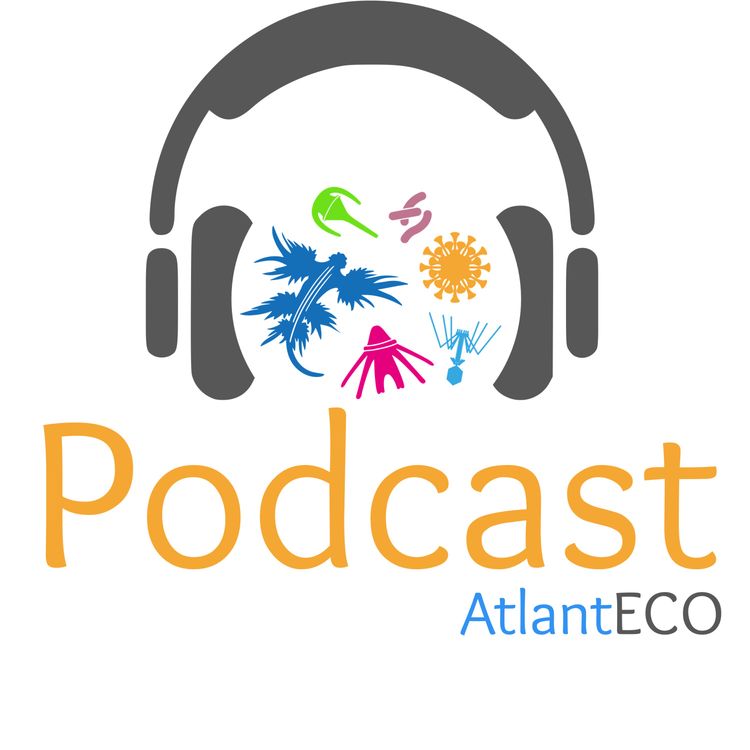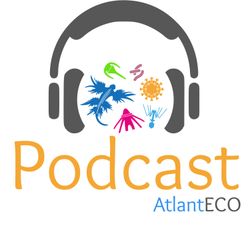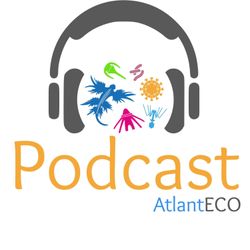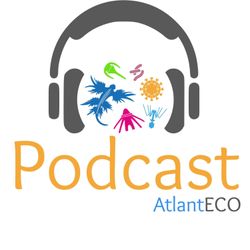Share

AtlantECO podcast
12. Braving the elements in Antarctica
The Weddell Sea in Antarctica plays a crucial role in the regulation of the planet’s climate with an important participation in geochemical cycles, however we are still lacking a lot of data to understand how it functions and how it affects marine microbiomes in this region and those connected through the currents present there.
What happens in the Weddell Sea, and how will a better understanding of its functioning help us model the evolution of the ocean, its health and its contributions to ecosystem services over time?
To answer these questions, today we are talking to Alessandro Tagliabue who was chief scientist on board of Tara as they chased around icebergs in Antarctica. Alessandro is a professor from the University of Liverpool, in the United Kingdom, as an ocean biogeochemist, he is interested in how the cycling of resources in the sea affects biological activity and vice-versa.
During our conversation Alessandro explains the challenges that exist in studying this region, and why it is so important to study it to better understand the ocean’s health, its evolution and functioning. He recounts the conditions in which the team worked together to collect the samples and data, and the life on board, witnessing amazing wildlife in this very special region of the Atlantic Ocean.
Additional information and resources:
YouTube video:
Find out more about AtlantECO on
Our website: www.atlanteco.eu
Twitter: @EU_AtlantECO
Instagram: @eu.atlanteco
Facebook: @Atlanteco-EU-107893811437643
YouTube: UCg1fWuQLlpSnnV8aVocHphQ
The AtlantECO project has received funding from the European Union’s Horizon 2020 research and innovation programme under grant agreement No 862923. This output reflects only the author’s view and the European Union cannot be held responsible for any use that may be made of the information contained therein.
More episodes
View all episodes

9. 53. Ecological networks
11:04||Season 3, Ep. 9In this episode of the AtlantECO podcast, we had the privilege of speaking with Ferenc Jordan, an expert in network analysis, who shared insights into the importance of this methodology in studying the ocean. Although Ferenc hails from Hungary, a landlocked country, his fascination with the sea began in childhood, inspired by the documentaries of David Attenborough and Jacques Cousteau. His journey in marine science and ecology led him to explore the fascinating world of network analysis, an essential tool for understanding marine ecosystems.Network analysis is a method of studying systems made up of interacting elements. These interactions can occur between species in an ecosystem, animals in a group, or even individuals in a society. By analysing the structure of these interactions, we can uncover valuable insights that would be missed by focusing on individual elements in isolation.Ferenc explains that in the context of the AtlantECO project, network analysis plays a critical role in studying the microbiome—the trillions of microorganisms that live in marine environments. These microbes, though invisible to the naked eye, form incredibly complex networks, interacting with each other in ways that are not yet fully understood. By mapping these relationships, scientists aim to uncover how different microbes work together or avoid each other, helping to unlock the ecological processes that govern the ocean.Studying the microbial networks in the ocean presents unique challenges. Unlike the traditional food webs of animals, where we can directly observe predator-prey relationships, microbial networks are harder to interpret. Microbes can coexist or avoid each other without any clear sign of direct interaction. The data collected in the AtlantECO project shows how these microorganisms occur together in certain patterns, but the meaning behind these patterns—whether it indicates cooperation or competition for example—remains unclear.Ferenc describes the process of creating smaller, more manageable networks from large, complex microbial datasets. Aggregating these networks to identify "key" microbes—those that play a crucial role in maintaining the stability of the community—can provide valuable insights into the overall health of marine ecosystems. This is a topic of ongoing research in AtlantECO, and the results will likely shed light on new ways to monitor and manage ocean health.One of the key goals of network analysis in the AtlantECO project is to develop indicators that can help communicate the health of marine ecosystems to decision-makers and stakeholders. Just as GDP is a simple indicator of a country's economic health, network-based indicators could signal the well-being of marine environments. These indicators would provide a clear, easily understandable metric that could inform policy decisions and guide the sustainable management of ocean resources.Ferenc also shared his passion for science communication, particularly with younger audiences. As a scientist, he believes it is crucial to make complex research accessible and relatable to the next generation. His goal is not just to contribute to scientific understanding but also to inspire young people to engage with environmental issues and become advocates for the planet's future.More on AtlantECO: www.atlanteco.eu The AtlantECO project has received funding from the European Union’s Horizon 2020 research and innovation programme under grant agreement No 862923. This output reflects only the author’s view and the European Union cannot be held responsible for any use that may be made of the information contained therein.
8. 52. Artificial intelligence in oceanography
13:19||Season 3, Ep. 8Diving into Ocean Dynamics: A Conversation with Bruno Buongiorno NardelliIn this episode of the AtlantECO podcast, we got the chance to sit down with Bruno Buongiorno Nardelli, a researcher based in Italy, who has spent over two decades studying the impact of ocean dynamics on climate and marine ecosystems. Join us as we unravel the complexities of his work, understand its significance, and explore what the future holds.Bruno's research focuses on understanding how various oceanic variables contribute to climate change and the behavior of marine ecosystems. Initially, his scientific education centered around geophysical fluid dynamics and remote sensing. Combining these areas, he has developed techniques utilising statistical analysis, physical models, and artificial intelligence to interpret observations and improve our knowledge of the earth’s systems.One core aspect of his research involves collecting and analyzing data from both remote sensing technologies and in situ observations. This approach allows scientists to develop more accurate predictive models and forecasts by understanding underlying processes more thoroughly. He stresses the importance of continuous observation to grasp these complex dynamics, as surface-level data alone cannot provide the full picture.Within the AtlantECO project, Bruno's efforts are directed towards analysing data to understand phytoplankton abundance through ocean color satellite data and separating natural oceanic oscillations from those induced by anthropogenic activities. Such work is vital not just for determining the ocean’s current state but also for predicting future impacts on marine ecosystems and validating climatic models.Bruno mentions that his work extends to shaping future satellite missions for the European Space Agency. These missions aim to improve our observational capabilities, especially concerning the air-sea interface dynamics. Another significant aspect is understanding how mesoscale turbulence helps transport carbon vertically within the ocean—a critical component of the global carbon cycle.Bruno acknowledges that scientific investigation is a never-ending journey. The continuous cycle of discovery and inquiry is central to advancing our understanding of ocean dynamics and their broader implications. Once AtlantECO ends, the data and insights generated will serve as a foundation for future research and projects.The ultimate goal is to provide robust data and sophisticated tools that will enable policymakers to make informed decisions regarding oceanic and environmental stewardship. Thus, Bruno and his colleagues' work is deeply intertwined with the broader mission of sustaining and protecting ocean health in this era of rapid climate change.More on AtlantECO: www.atlanteco.eu The AtlantECO project has received funding from the European Union’s Horizon 2020 research and innovation programme under grant agreement No 862923. This output reflects only the author’s view and the European Union cannot be held responsible for any use that may be made of the information contained therein.
7. 51. Exploring the Potential of the Atlantic Ocean: What is Bioprospecting?
22:17||Season 3, Ep. 7In this episode, we delve into the fascinating world of bioprospecting with Tonje Heggeset and Giang-Son Nguyen from SINTEF, a renowned research organisation in Norway. In conversation with Tonje and Giang-Son, we uncover the essence of bioprospecting, its applications, and its significance within the AtlantECO project. First, we ask… what is bioprospecting? Bioprospecting involves exploring various natural sources like plants, animals, and microorganisms for commercially valuable substances such as medicinal drugs, biochemicals, and other materials. In the context of the project, the focus is on microorganisms, including bacteria and fungi, discovered in environments rich in biodiversity. These microorganisms can potentially yield new antibiotics, anti-cancer compounds, and industrial enzymes, contributing to significant advancements in medicine and industry.We then transition into the methodologies of bioprospecting. Our guests explain that there are two primary approaches: functional screening and genome/metagenome sequencing. Functional screening involves searching for specific activities in nature, such as antibiotics. On the other hand, genome sequencing entails identifying genes and predicting their functions using bioinformatics tools.Within the AtlantECO project, SINTEF is in charge of molecular bioprospecting, focusing on discovering new enzymes relevant to stakeholders. This involves data mining from various sources, functional screening, and creating a database of genetic markers for biological sensors. The aim is to provide valuable enzyme candidates for diagnostics, molecular research, and other applications, contributing to the blue economy.More on AtlantECO: www.atlanteco.eu The AtlantECO project has received funding from the European Union’s Horizon 2020 research and innovation programme under grant agreement No 862923. This output reflects only the author’s view and the European Union cannot be held responsible for any use that may be made of the information contained therein.
6. 50. Modelling a constantly moving Ocean
16:05||Season 3, Ep. 6In this episode of the AtlantECO podcast, we explore the journeys and research of early-stage researchers involved in the AtlantECO project. Today, we meet Darshika Manral, a PhD candidate in physical oceanography at Utrecht University in the Netherlands.Darshika’s connection with the ocean came later in her career. She began in Information Technology with a Bachelor’s degree and worked as a software engineer. However, a sabbatical brought her to marine mammal research in the Lakshadweep Islands, igniting her passion for the ocean. This pivotal experience led her to pursue an Erasmus Mundus master's in marine science, blending her programming skills with ocean studies.Darshika investigates how ocean currents transport substances like plankton, plastics, nutrients, and heat using Lagrangian modelling. This method tracks the movement of virtual particles, providing insights into marine connectivity and helping predict future ocean changes. Her research plays a key role in AtlantECO’s mission to understand plankton distribution and marine ecosystems better.Within AtlantECO, Darshika's work on seascape and connectivity focuses on plankton networks and environmental constraints. Combining her model outputs with real-world observations, she collaborates with biologists to offer a comprehensive view of oceanic processes, supporting better marine conservation strategies.In her final PhD year, Darshika aims to refine her models further and strengthen collaborations. She is open to continuing in academia or any ocean research-related field, with a keen interest in science communication. Her advice for budding marine scientists? Embrace interdisciplinary research, seek community support, and remain observant of the natural world.Darshika’s message is clear: anyone can develop a connection with the ocean by staying curious and observant. Her inspiring journey underscores the importance of passion and openness to new challenges. We thank Darshika for sharing her insights and wish her success in her future endeavors.More on AtlantECO: www.atlanteco.eu The AtlantECO project has received funding from the European Union’s Horizon 2020 research and innovation programme under grant agreement No 862923. This output reflects only the author’s view and the European Union cannot be held responsible for any use that may be made of the information contained therein.
5. 49. Ocean cultures in South Africa
16:56||Season 3, Ep. 5In the latest AtlantECO podcast we are exploring the fascinating realm of ocean cultures with our guest, Leila Nefdt from the University of Cape Town in South Africa.Leila brings a wealth of experience in marine biology and a deep commitment to ocean conservation and public engagement. Her journey from marine ecologist to science communicator offers unique insights into bridging the gap between scientific knowledge and community awareness.In our conversation, Leila shares her passion for nature, particularly the ocean, and her dedication to fostering ocean awareness through initiatives like See the Bigger Picture and her role at MARIS. She highlights the importance of connecting diverse communities with marine science and conservation efforts.We delve into the concept of ocean cultures, a term evolving from ocean literacy to encompass a broader understanding of the ocean's influence on society and vice versa. Leila explains how this shift in terminology reflects the rich tapestry of beliefs, traditions, and interactions that shape people's relationship with the ocean, especially in South Africa.Despite South Africa's coastal abundance, Leila notes the disparities in ocean access and perception among different populations. While some communities rely on the ocean for their livelihoods and spiritual practices, others face barriers like limited swimming skills or geographic distance from the coast.Turning to AtlantECO's contributions, Leila discusses ongoing efforts to enhance ocean literacy and engagement in South Africa. From developing educational resources to assessing marine science curricula, AtlantECO aims to bridge the gap between scientific knowledge and local needs.Leila emphasizes the importance of collaboration and cultural sensitivity in promoting ocean stewardship. By fostering dialogue between scientists, educators, and communities, AtlantECO seeks to empower individuals to become advocates for marine conservation.With continued effort and collaboration, we can nurture a deeper connection to the ocean and ensure its protection for generations to come.Stay tuned for more updates on AtlantECO's initiatives and how you can get involved in shaping our ocean future.More on AtlantECO: www.atlanteco.eu The AtlantECO project has received funding from the European Union’s Horizon 2020 research and innovation programme under grant agreement No 862923. This output reflects only the author’s view and the European Union cannot be held responsible for any use that may be made of the information contained therein.
4. 48. Strengthening biodiversity observation in support of decision making
31:24||Season 3, Ep. 4In this episode of the AtlantECO podcast we delve into the Marco Bolo project with guest Nicolas Pade, the project coordinator. Marco Bolo is a research and innovation initiative funded by the European Union's Horizon Europe program. Nicolas shares his personal connection to the ocean, rooted in childhood experiences and a lifelong passion for marine biology.The discussion highlights the need to enhance biological observation in marine sciences, which often focus on physics and chemistry. Nicolas stresses the importance of integrating biology into observation efforts, aiming to create a robust base for biological data collection. He emphasises the necessity of open data practices and stakeholder engagement to ensure the data collected are relevant and utilised effectively.The Marco Bolo project addresses these challenges through three main components:Data Interoperability: Implementing high standards for data interoperability, making data open and accessible.Data Collection and Application: Developing robust protocols for data collection, applying collected data to inform environmental indicators and essential ocean variables.Stakeholder Engagement: Engaging stakeholders through surveys, community of practice meetings, and collaboration with other projects to ensure alignment with user needs.Nicolas highlights the importance of collaboration and coordination with other projects, acknowledging the complexity of marine observation and the diverse needs of stakeholders. The project aims to bridge the gap between research and decision-making, striving to create a global impact in marine science.Looking ahead, the project anticipates further stakeholder engagement, including community of practice meetings and stakeholder events. They also plan to address challenges such as adapting data to different indicators and expanding their team through recruitment efforts.Overall, the Marco Bolo project represents a concerted effort to advance marine science and foster collaboration within the research community, with the ultimate goal of improving our understanding and management of the oceans.Find out more on MARCO BOLO: https://marcobolo-project.eu/ More on AtlantECO: www.atlanteco.eu The AtlantECO project has received funding from the European Union’s Horizon 2020 research and innovation programme under grant agreement No 862923. This output reflects only the author’s view and the European Union cannot be held responsible for any use that may be made of the information contained therein.
3. 47. Shallow sea mining
18:45||Season 3, Ep. 3In the latest episode of the AtlantECO podcast, we delve into one of our case studies, which aims to apply the knowledge and resources developed in the project to existing challenges in shallow sea diamond mining. Our guest, Natasha Karenyi, sheds light on the considerations necessary for developing and implementing environmental regulations of coastal areas.Natasha, a marine biologist and lecturer at the University of Cape Town (UCT), shares her journey toward studying and researching marine biology. With a childhood curiosity sparked by high school biology classes and a love for swimming, Natasha's passion for the ocean led her to specialise in benthic ecology and pursue a PhD at the Nelson Mandela University.In our case study, we focus on two countries, Namibia and South Africa, both of which have keen interests in diamond and phosphate mining, as well as petroleum extraction. However, these countries have different policy frameworks, data limitations, and understandings of their marine systems. Natasha highlights the specific challenges and needs within each country and the importance of addressing them to develop effective environmental regulations.Supporting Policy Making through AtlantECO: to address these challenges, AtlantECO implements various strategies. In Namibia, they collaborate with the Namibian Ministry of Fisheries and Marine Resources and Debmarine Namibia to provide baseline benthic information for informed policy decisions. In South Africa, they work with the Department of Mineral Resources to develop guidelines for environmental management of ocean mining.Through research and collaborative efforts, Natasha and her team have identified several challenges that hinder effective environmental impact assessments (EIAs) and marine spatial planning (MSP) processes. These challenges include the lack of consideration for cumulative and indirect impacts, insufficient inclusion of social and economic aspects, and limited access to information; these aspects were all included in the recommendations made recently. As we progress, we aim to further support the different stakeholders in their endeavour to develop EIA processes, streamline reporting standards across sectors, and enhance the integration of social and economic considerations.More on AtlantECO: www.atlanteco.eu The AtlantECO project has received funding from the European Union’s Horizon 2020 research and innovation programme under grant agreement No 862923. This output reflects only the author’s view and the European Union cannot be held responsible for any use that may be made of the information contained therein.
2. 46. Mega marine heatwaves in the North Atlantic
21:49||Season 3, Ep. 2In the latest episode of the AtlantECO Podcast, we delve into the critical topic of mega heatwaves in the Atlantic withguest Thomas Frölicher. The conversation covers the causes, consequences, monitoring, and future expectations of theseincreasingly observed phenomena, including the recent heatwave observed in the North Atlantic.Thomas Frölicher, originally from landlocked Switzerland, shares his unique journey into oceanography. Growing up with a curious mind inspired by his father's interest in physics, Thomas eventually found his passion for environmental science. His focus on atmospheric physics led him to explore oceanography during his PhD, where he investigated the variations in oceanic oxygen concentration and its connection to human-caused global warming.We then discuss marine heatwaves, defined as periods of persistently warm ocean temperatures. Thomas explains that these events are becoming more prevalent globally, affecting ecosystems, weather patterns, and land conditions. The North Atlantic, in particular, is experiencing mega heatwaves, with temperatures significantly higher than ever recorded. Thomas discusses potential causes of marine heatwaves, such as enhanced air-sea heat uptake, changing ocean currents, and various other factors. The global ocean currently faces record-high temperatures, with about 30% experiencing a marine heatwave. The North Atlantic stands out with temperatures 0.5 degrees higher than previous records, raising concerns among scientists.To understand these heat waves, scientists rely on high-temporal-resolution datasets from satellites, ARGO floats, buoys, and ocean models. Thomas emphasises the importance of collaboration among researchers with diverse expertise to comprehensively analyse the multitude of factors contributing to the current temperature anomalies. We then touch upon the consequences of mega heat waves on marine life and ecosystems, and Thomas highlights the sensitivity of ecosystems to high temperatures, leading to damages worth billions of dollars in industries such as fisheries and tourism. In AtlantECO project, Thomas and his team aim to assess the impact of a combination of multiple extreme events in the Atlantic, providing valuable data for managing ocean resources and mitigating risks.More on AtlantECO: www.atlanteco.eu The AtlantECO project has received funding from the European Union’s Horizon 2020 research and innovation programme under grant agreement No 862923. This output reflects only the author’s view and the European Union cannot be held responsible for any use that may be made of the information contained therein.
1. 45. Navigating the Ocean's Wonders with Mayibongwe Buthelezi
16:34||Season 3, Ep. 1A Journey from Nongoma to the Atlantic Ocean: Mayi, currently in the second year of his Ph.D. at the University of Pretoria, takes us through his remarkable journey. Born and raised in the small village town of Nongoma in Kwazulu Natal, South Africa, Mayibongwe's connection with the ocean began unexpectedly during a school trip in grade 10 or 11. Despite being inland, he pursued microbiology, eventually participating in prestigious cruises, exploring the Atlantic Ocean's marginal ice zone.Microbial Marvels in the Ocean: Mayi's research focuses on marine microbial communities, specifically bacteria and single-cell algae. He delves into the intricate world of microbial ecology, emphasising the importance of understanding microorganisms' role in processes like carbon sequestration and nitrogen cycling. His work, centred around Dimethylsulfoniopropionate (DMSP), seeks to uncover microbial physiological responses to environmental fluctuations. Mayibongwe explains the significance of studying microorganisms in the ocean, highlighting how these tiny organisms, with their enormous impact, play a crucial role in maintaining Earth's balance by cycling essential gases and nutrients.Sailing the Atlantic Meridional Transect (AMT): Mayibongwe shares his experience aboard the RRS Discovery during the latest AMT. The AMT, an annual multidisciplinary program, conducts biological, chemical, and physical oceanographic research between the UK and the South Atlantic. Mayibongwe's role involved collecting seawater samples for his Ph.D., contributing valuable data to the AtlantECO project. Mayibongwe reflects on the unique experience of being the only representative from his region, the joy of encountering penguins in Falklands Island, and the unexpected birthday celebration during the crossing of the line. He expresses gratitude to his supervisor, Prof. Makhalanyane, and the AtlantECO programme for exposing him to these extraordinary opportunities.Future Aspirations: Looking ahead, Mayi acknowledges current collaborators like Prof. Jonathan Todd and his research group at the University of Norwich, emphasising the importance of collaboration in DMSP research. His immediate goals include completing his Ph.D., publishing papers, and continued engagement with the AtlantECO program. Ultimately, Mayibongwe aspires to establish his own research group and collaborate with scientists globally.Stay tuned for the next episode and more engaging conversations with scientists shaping the future of marine research. More on AtlantECO: www.atlanteco.eu The AtlantECO project has received funding from the European Union’s Horizon 2020 research and innovation programme under grant agreement No 862923. This output reflects only the author’s view and the European Union cannot be held responsible for any use that may be made of the information contained therein.